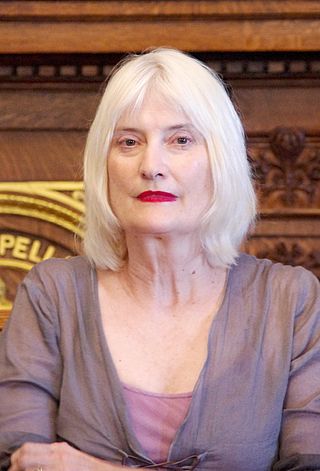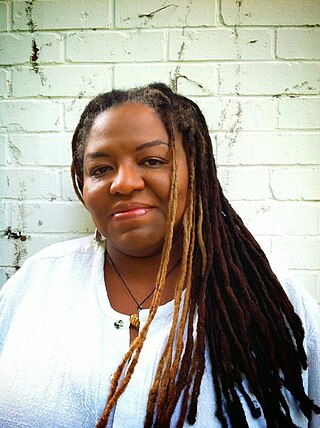
Judy Chicago is an American feminist artist, art educator, and writer known for her large collaborative art installation pieces about birth and creation images, which examine the role of women in history and culture. During the 1970s, Chicago founded the first feminist art program in the United States at California State University, Fresno and acted as a catalyst for feminist art and art education. Her inclusion in hundreds of publications in various areas of the world showcases her influence in the worldwide art community. Additionally, many of her books have been published in other countries, making her work more accessible to international readers. Chicago's work incorporates a variety of artistic skills, such as needlework, counterbalanced with skills such as welding and pyrotechnics. Chicago's most well known work is "The Dinner Party", which is permanently installed in the Elizabeth A. Sackler Center for Feminist Art at the Brooklyn Museum. "The Dinner Party" celebrates the accomplishments of women throughout history and is widely regarded as the first epic feminist artwork. Other notable art projects by Chicago include International Honor Quilt, The Birth Project, Powerplay, and The Holocaust Project. She is represented by Jessica Silverman gallery and Salon 94 gallery.

Fiber art refers to fine art whose material consists of natural or synthetic fiber and other components, such as fabric or yarn. It focuses on the materials and on the manual labor on the part of the artist as part of the works' significance, and prioritizes aesthetic value over utility.

The Dinner Party is an installation artwork by feminist artist Judy Chicago. Widely regarded as the first epic feminist artwork, it functions as a symbolic history of women in civilization. There are 39 elaborate place settings on a triangular table for 39 mythical and historical famous women. Sacajawea, Sojourner Truth, Eleanor of Aquitaine, Empress Theodora of Byzantium, Virginia Woolf, Susan B. Anthony, and Georgia O'Keeffe are among the symbolic guests.

Sallie Bingham is an American author, playwright, poet, teacher, feminist activist, and philanthropist. She is the eldest daughter of Barry Bingham, Sr., patriarch of the Bingham family of Louisville, Kentucky.
Suzanne Lacy is an American artist, educator, writer, and professor at the USC Roski School of Art and Design. She has worked in a variety of media, including installation, video, performance, public art, photography, and art books, in which she focuses on "social themes and urban issues." She served in the education cabinet of Jerry Brown, then mayor of Oakland, California, and as arts commissioner for the city. She designed multiple educational programs beginning with her role as performance faculty at the Feminist Studio Workshop at the Woman's Building in Los Angeles.

Arlene Raven was a feminist art historian, author, critic, educator, and curator. Raven was a co-founder of numerous feminist art organizations in Los Angeles in the 1970s.
Louisville Collegiate School is a Junior Kindergarten - 12th grade, co-ed independent school located in the historic Highlands neighborhood of Louisville, Kentucky, United States. The school enrolls 750 students at 2427 Glenmary Avenue.

The feminist art movement in the United States began in the early 1970s and sought to promote the study, creation, understanding and promotion of women's art. First-generation feminist artists include Judy Chicago, Miriam Schapiro, Suzanne Lacy, Judith Bernstein, Sheila de Bretteville, Mary Beth Edelson, Carolee Schneeman, Rachel Rosenthal, and many other women. They were part of the Feminist art movement in the United States in the early 1970s to develop feminist writing and art. The movement spread quickly through museum protests in both New York and Los Angeles, via an early network called W.E.B. that disseminated news of feminist art activities from 1971 to 1973 in a nationally circulated newsletter, and at conferences such as the West Coast Women's Artists Conference held at California Institute of the Arts and the Conference of Women in the Visual Arts, at the Corcoran School of Art in Washington, D.C..

Feminist art is a category of art associated with the late 1960s and 1970s feminist movement. Feminist art highlights the societal and political differences women experience in their lives. The hopeful gain from this form of art is to bring a positive and understanding change to the world, in hope to lead to equality or liberation. Media used range from traditional art forms such as painting to more unorthodox methods such as performance art, conceptual art, body art, craftivism, video, film, and fiber art. Feminist art has served as an innovative driving force towards expanding the definition of art through the incorporation of new media and a new perspective.
Quilt art, sometimes known as art quilting, mixed media art quilts or fiber art quilts, is an art form that uses both modern and traditional quilting techniques to create art objects. Practitioners of quilt art create it based on their experiences, imagery, and ideas, rather than traditional patterns. Quilt art generally has more in common with the fine arts than it does with traditional quilting. Quilt art is typically hung or mounted.

Terese Svoboda is an American poet, novelist, memoirist, short story writer, librettist, translator, biographer, critic and videomaker.
Sarabande Books is an American not-for-profit literary press founded in 1994. It is headquartered in Louisville, Kentucky, with an office in New York City. Sarabande publishes contemporary poetry and nonfiction. Sarabande is a literary press whose books have earned reviews in the New York Times.

Crystal E. Wilkinson is an African-American feminist writer from Kentucky, and proponent of the Affrilachian Poet movement. She is the winner of a 2022 NAACP Image Award, a 2020 winner of the USA Fellow of Creative Writing, and a 2021 O. Henry Prize winner. She teaches at the University of Kentucky. Her work has primarily been in involving the stories of Black women and communities in the Appalachian and rural Southern canon. She was appointed Poet Laureate of Kentucky 2021.
New York Feminist Art Institute (NYFAI) was founded in 1979 by women artists, educators and professionals. NYFAI offered workshops and classes, held performances and exhibitions and special events that contributed to the political and cultural import of the women's movement at the time. The women's art school focused on self-development and discovery as well as art. Nancy Azara introduced "visual diaries" to artists to draw and paint images that arose from consciousness-raising classes and their personal lives. In the first half of the 1980s the school was named the Women's Center for Learning and it expanded its artistic and academic programs. Ceres Gallery was opened in 1985 after the school moved to TriBeCa and, like the school, it catered to women artists. NYFAI participated in protests to increase women's art shown at the Museum of Modern Art, The Whitney Museum of American Art and other museums. It held exhibitions and workshops and provided rental and studio space for women artists. Unable to secure sufficient funding to continue its operations, NYFAI closed in 1990. Ceres Gallery moved to SoHo and then to Chelsea and remained a gallery for women's art. However, a group continues to meet called (RE)PRESENT, a series of intergenerational dialogues at a NYC gallery to encourage discussion across generations about contemporary issues for women in the arts. It is open to all.
Ann Stewart Anderson was an artist from Louisville, Kentucky whose paintings have "focused on the rituals of being a woman." Anderson is known for her part in creating the collective work, the "Hot Flash Fan," a fabric art work about menopause funded by the National Endowment for the Arts. She was the executive director of the Kentucky Foundation for Women.
Bianca Lynne Spriggs is an American poet and multidisciplinary artist born in Milwaukee, WI. While widely considered a born-and-bred Kentuckian, she actually moved around a lot due to the nature of her parents' work. For several years of her childhood, she would bounce around from Florida, Indiana, and Milwaukee. She moved to Kentucky when she was eleven years old and lived there the longest. She currently resides in Athens, OH where she is an Assistant Professor of English at Ohio University. As a second generation Affrilachian Poet, she is the author of Kaffir Lily, How Swallowtails Become Dragons, The Galaxy is a Dance Floor, and Call Her By Her Name. She is the editor of The Swallowtale Project: Creative Writing for Incarcerated Women (2012), and co-editor of the anthologies, Circe's Lament: An Anthology of Wild Women, Undead: A Poetry Anthology of Ghouls, Ghosts, and More, and Black Bone: 25 Years of the Affrilachian Poets(University of Kentucky Press, 2018).

Lori Brown is American architect and the co-founder of ArchiteXX, a group dedicated to transforming the architecture profession for women. She is a registered architect, author and associate professor at Syracuse University. Her research focuses on architecture and social justice issues with particular emphasis on gender and its impact upon spatial relationships. She is a member of both the American Institute of Architects and the American Association of University Women.

The International Honor Quilt is a collective feminist art project initiated in 1980 by Judy Chicago as a companion piece to The Dinner Party. The piece is a collection of 539 two-foot-long quilted triangles that honor women from around the world. Through the Flower, Chicago's not-for-profit organization, gifted the collection to University of Louisville Hite Art Institute in 2013 to be available for research and to exhibit.
Alma Lesch was an American fiber artist known for her fiber portraits. She was "the undisputed grande dame of Kentucky textile arts." A historic marker notes her achievements in Shepherdsville, Kentucky where Lesch lived and had her studio. Lesch's quilt, Bathshebas Bedspread, was included in the Objects: USA exhibit in 1969, which was organized by S.C. Johnson and Son.

Shannon Cain is an American writer, editor, teacher, visual artist, and activist living in France. She is the founder of La Maison Baldwin, an organization that celebrates the life of James Baldwin in Saint-Paul de Vence. Cain authored the short story collection The Necessity of Certain Behaviors, winner of the 2011 Drue Heinz Literature Prize.












